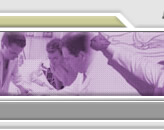



|
Resident Education - Staying
Involved
 by Jarrod Shapiro, DPM Joined practice of John K Throckmorton,DPM,PC Lansing, Michigan July 2006 One of the places I have block time is a predominantly orthopedic hospital. If you looked at the surgical board, you'd see ankle ORIFs, carpal tunnel releases, hip replacements, etc. If you looked around the floors, you'd see the occasional orthopedic resident. However, none of these residents scrub with either my boss or myself. Since leaving residency, I've done zero surgical cases with residents - until the other day. I was in the OR waiting to start a case, and an ER resident rotating with orthopedics introduced himself to me and asked to watch my case (a hammertoe 2nd repair with PIPJ arthrodesis and MPJ release). "Instead of watching, why don't you scrub in?" I asked him. He agreed, and we had a pleasant case which went well. With the exceptions of podiatry and foot and ankle orthopods, no one has a solid understanding or appreciation of the mechanics of digital function or how to repair it. For the resident, this case was an entirely unique educational experience that he's unlikely to encounter in his orthopedic rotation. It turns out he had a case of predislocation syndrome that was incorrectly diagnosed by one of his attendings as a Morton's neuroma, which is now progressing to a frank hammertoe with adductus deformity. As we discussed his options in the dressing room, one of the more senior orthopedic attendings came in and listened with interest to our conversation. It turned into a quickie inservice! I bring this episode up to illustrate a couple of ideas. First, podiatrists are THE experts in foot and ankle function. The fact that an orthopedist who's been in practice for 30 years stops to listen to a podiatrist in practice for 7 months argues my point well. Second, resident education is so important for so many reasons. These are our future colleagues. These are the future peers we'll be consulting for infectious disease consults, the internists taking care of our admitted patients and those we send to the ER. One of them might take care of you in the future! You don't know; they might even be the expert testimony in a malpractice suit against you. From a business standpoint, these will be the docs referring their patients to you. In our office, we have PM&R and family practice residents rotating through as part of their programs. These residents, the vast majority of which end up practicing in the area, gather an appreciation for what we do as foot and ankle specialists. Their eyes are opened to the numerous ways we can help their respective practices. Additionally, do they not become referral sources during and after graduation? Finally, educating others makes you a better physician. You have to know what you're talking about to educate others, improving your own knowledge base. You'll be exposed to many other viewpoints and approaches to medicine. It's also intellectually stimulating to discuss something you're interested in and have spent many years mastering. Here's my New Doc advice to residents. After you graduate, stay involved in resident education as much as possible. Educate anyone who will listen, orthopod, internal medicine, nursing, etc. You'll increase your exposure to the medical community and will be intellectually uplifted in the process. Best wishes. Be sure to read the Letters to the Editor below. Talk to me,
In Your Words In line with Time magazine's assertion that "YOU" are the most influential person of the year, here are some recent letters to the editor. Write in and have your opinions heard. They matter! ***Response to Electronic Medical Records Editorial*** I understand what you are talking about. I am in a very similar situation/relationship as you. We do have EMR already in this office and now getting DME is my next adventure. He's been in practice for at least 25 years, but yet very open minded and receptive to my suggestions. I admire the fact that he is very open minded because there are many podiatrists of his time that are not. Many still don't know how much more trained we are and how much more we can do now. You are right that it is important to have a good open relationship where you can talk about and share ideas. I have been here about 7 months too. Here's something to think about or maybe use as a topic. I and my associate had applied for hospital privileges at a local hospital. We went through the application process and I met with the chief of podiatry at this hospital. We talked, and I was so surprised when he told me that podiatrists cannot do ankle fractures at this hospital. This is in NJ. I asked him even if it's my own private patient? He said, yes, that I cannot do ankle fractures on my own patient at that hospital. I couldn't believe it! What was even worse was that he didn't think it was a big deal and just accepted the situation as something normal. I was so disappointed. I wondered if he realized what we can do nowadays and how our training is. I graduated from St. Mary's hospital in Hoboken, NJ, a pretty good surgical training. I felt insulted and let down by my own colleagues for accepting that deal with the orthopedists. I just think that he is very ignorant. So, I and my associate withdrew our applications. Meanwhile, our other hospital affiliations within 10-15 minutes from that hospital give us the full scope of practice that we have in the state of NJ with no problem.
Vilayvanh Sysounthone, DPM EDITOR'S RESPONSE Unfortunately, for a variety
of reasons, not all of our representatives are watching out for our
best interests. The best thing to do is get involved with the
process. Get involved with hospital committees and make friends with
as many docs as you can. Maybe this experience will prompt you to
take over for this person when the opportunity arises. Good luck and
keep fighting! ***Doing Well In Practice*** I myself am new into practice and have learned a lot from my first 1.5 years in practice. Most of my first year experience wasn't all that pleasant and had a "bad deal" with a doctor and the practice. I look back and realize that this experience has taught me many things about myself and what type of practice I want to join. I searched for about 6 months before I discovered a practice in Sturgis, Michigan. It was a perfect match! Even though I feel like I am starting over, I have redeveloped myself as a podiatric surgeon and enjoy practicing. Most of all, I have learned to always stay positive no matter what situation you are in because we all experience hardships! Your editorials have influenced me to continue on and don't look back. Take care and keep writing!
Christopher W. Bussema, DPM *** New Doc Practice Questions*** I wanted to see if you had an opinion about, or experience with the difference between a sole proprietor vs. corporation status. I've asked SO many people their opinion on this topic, and I've gotten just as many different answers, but your situation sounds as close to mine as anyone else I have come across. The practice I'm joining is a PC, and I've been told that it could be beneficial for me to start my own corporation now as an associate, and then when I buy into this person's practice (IF it works out), my corporation will actually be buying out all of or a portion of his corporation. In the meantime, when I'm just his associate, my corporation will work for his corporation, and my pay checks will go into my corporation bank account. etc. I don't really know if there is a benefit to this, and what that benefit may be if there is one. I have talked to a lot of people too! Do you have any opinions about this? What is your situation? Did you think about starting a corporation now, while being an associate?
I'm gathering that that there is
no right or wrong way to go about this, and it is different for
everyone, but I'm wondering if you have any say in the matter. When
I fill out my application for an NPI number, they ask me if I'm a
sole proprietor or part of a corporation, and I am stuck! Therefore,
I need to figure this out now because it is road-blocking me from
making my next step (applying for an NPI number and then a medicare
number). EDITOR'S RESPONSE
In short, I honestly don't know that much about
the subject outside of my own experience. However, in a nutshell you
don't need to incorporate yourself if you bill under the other doc's
tax ID number (in the associate situation). If you function as a
separate doctor, essentially sharing office space then I'd
incorporate. A PC protects your personal assets if your practice was
sued. It's more expensive, and you really need a lawyer for the
paperwork, but it's better than a sole proprietor (which has no
protection). You are doing the right thing by talking to as many
people as possible and good job getting all the paperwork done
before you start! It's a long and arduous process. I think the best
advice I can give is to speak with an independent lawyer and/or
accountant that specializes in medical doctors. If anyone has
experience with this write in and educate us. ***Response to Smell the Roses Editorial***
I Just read your note to
subscribers of PRESENT lecture series. I am glad to see that someone
has made the time to give this most valuable message of all. We look
to our teachers to guide us in life. Certainly in our professional
career. Sometimes stepping outside the box makes us see the box is
really a little bigger than we realize. Anyway, I recently concluded
my subscription to Present and have found it useful and interesting.
Having been out of school for over 20 years, you have kept me up to
date. The convenience of home education, online format and the high
quality of work you have put together is appreciated. EDITOR'S RESPONSE Thanks for your kind words. We
try to give the podiatric community a quality product. The people to
really thank, though, are the folks at PRESENT Courseware who work
tirelessly to provide us with fantastically creative resources. If
you haven't yet, look into Present Diabetes. It's just another
quality product from these folks and will be the future of
continuing medical education.
|

















